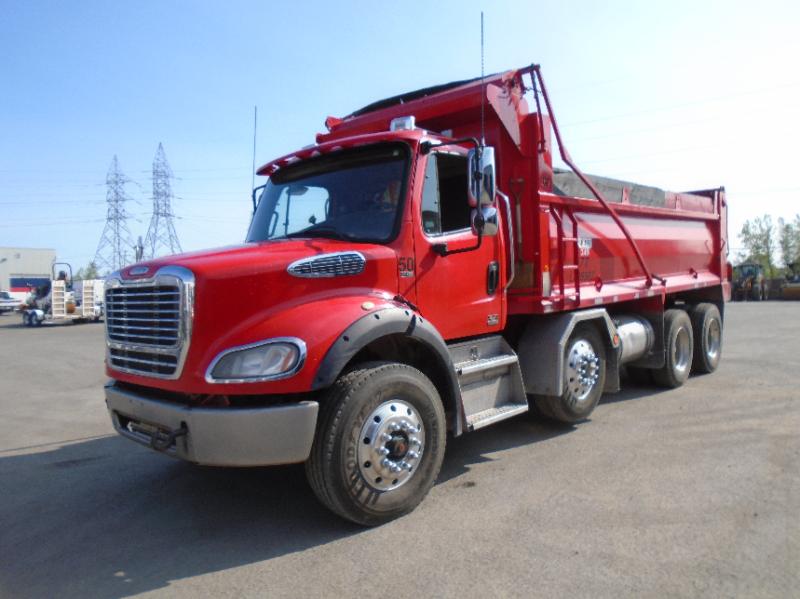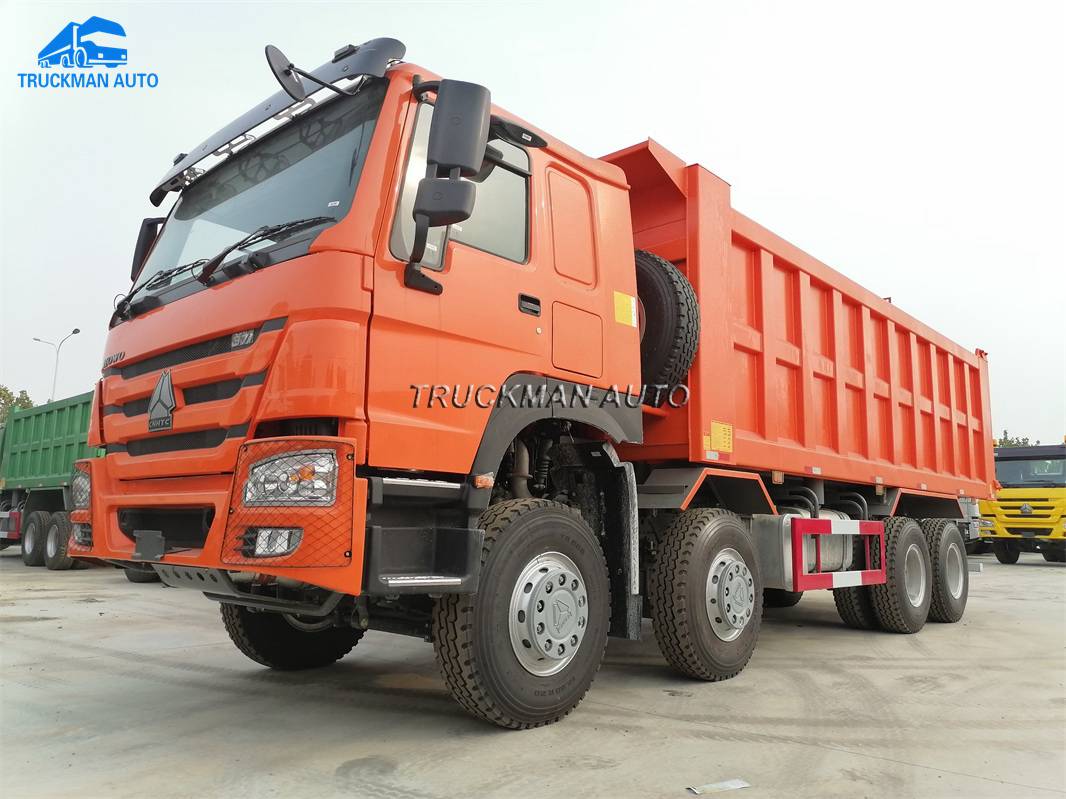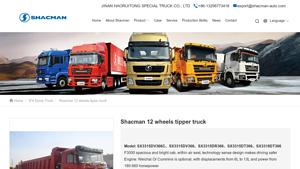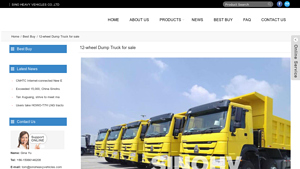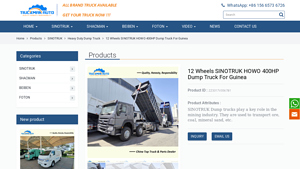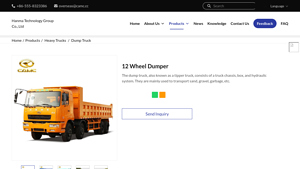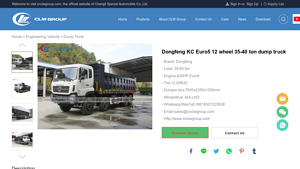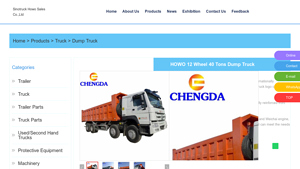Introduction: Navigating the Global Market for 12 Wheel Dump Truck
In the competitive landscape of the global market, sourcing a reliable 12 wheel dump truck can pose significant challenges for international B2B buyers. With diverse applications ranging from construction to mining, the need for a robust vehicle that meets specific operational requirements is paramount. This comprehensive guide delves into the various types of 12 wheel dump trucks available, their applications, and the critical factors to consider when selecting the right model for your needs.
Buyers will find detailed insights into the procurement process, including supplier vetting, cost analysis, and maintenance considerations, empowering them to make informed purchasing decisions. Whether you’re operating in Africa, South America, the Middle East, or Europe—regions characterized by unique market dynamics and regulatory landscapes—this guide offers tailored advice to navigate these complexities effectively.
Understanding the nuances of the 12 wheel dump truck market is essential for optimizing your fleet and ensuring operational efficiency. With this resource, you’ll gain access to valuable information that not only simplifies the purchasing process but also enhances your strategic decision-making capabilities. Equip yourself with the knowledge needed to thrive in the global marketplace and secure the best value for your investment in heavy-duty vehicles.
Understanding 12 Wheel Dump Truck Types and Variations
| Type Name | Key Distinguishing Features | Primary B2B Applications | Brief Pros & Cons for Buyers |
|---|---|---|---|
| Standard Tipper Truck | Fixed body with hydraulic lift for quick unloading | Construction, landscaping, waste removal | Pros: Versatile, cost-effective. Cons: Limited payload for certain materials. |
| Articulated Dump Truck | Flexible joint between cab and trailer | Mining, heavy-duty construction | Pros: Enhanced maneuverability, higher payload capacity. Cons: More expensive, requires skilled operation. |
| Side Dump Truck | Unloading on the side for efficient material drop | Road construction, aggregate transport | Pros: Faster unloading, ideal for tight spaces. Cons: Less stable on uneven terrain. |
| Rear Dump Truck | Traditional design with rear unloading capability | General construction, demolition | Pros: Simple operation, widely available. Cons: Slower unloading process. |
| Multi-axle Dump Truck | Additional axles for increased stability and capacity | Heavy construction, large-scale projects | Pros: Higher weight capacity, better stability. Cons: Increased maintenance costs and complexity. |
What Are the Characteristics of Standard Tipper Trucks?
Standard tipper trucks are characterized by their fixed body and hydraulic lift system, allowing for quick and efficient unloading of materials. They are commonly used in construction, landscaping, and waste removal applications. B2B buyers should consider factors such as payload capacity, fuel efficiency, and maintenance costs when evaluating this type. These trucks offer versatility and cost-effectiveness, making them a popular choice for various projects.
How Do Articulated Dump Trucks Enhance Maneuverability?
Articulated dump trucks feature a flexible joint between the cab and trailer, providing superior maneuverability in challenging terrains. This design is particularly beneficial in mining and heavy-duty construction applications. Buyers should assess the truck’s power, payload capacity, and operational requirements. While they tend to be more expensive and require skilled operators, their ability to navigate tight spaces and carry heavier loads makes them a valuable investment.
What Advantages Do Side Dump Trucks Offer?
Side dump trucks are designed to unload materials on the side, which allows for faster unloading and is ideal for road construction and aggregate transport. Their unique unloading mechanism is particularly advantageous in tight spaces. When purchasing, B2B buyers should consider stability, load capacity, and the types of materials being transported. While they provide quicker unloading times, they may be less stable on uneven terrain, which can pose operational risks.
Why Choose Rear Dump Trucks for General Construction?
Rear dump trucks are the traditional choice for many construction projects, equipped with a simple design that allows for rear unloading. They are widely available and easy to operate, making them suitable for general construction and demolition tasks. Buyers should focus on the truck’s unloading speed, payload capacity, and overall durability. Although the unloading process may be slower compared to other types, their reliability and straightforward operation make them a favored option.
What Makes Multi-Axle Dump Trucks Ideal for Heavy Projects?
Multi-axle dump trucks, featuring additional axles, provide increased stability and higher payload capacity, making them ideal for heavy construction and large-scale projects. B2B buyers should evaluate the truck’s weight distribution, maintenance needs, and operational costs. While these trucks offer significant advantages in terms of load capacity and stability, they also come with increased maintenance requirements and complexity, which should be factored into the purchasing decision.
Key Industrial Applications of 12 Wheel Dump Truck
| Industry/Sector | Specific Application of 12 Wheel Dump Truck | Value/Benefit for the Business | Key Sourcing Considerations for this Application |
|---|---|---|---|
| Construction | Transporting construction materials and debris | Efficiently moves large volumes of materials, reducing labor costs and project timelines. | Load capacity, durability, and engine power for heavy loads. |
| Mining | Hauling minerals and aggregates | Increases productivity by transporting materials from remote locations to processing sites. | Terrain capability and maintenance support in remote areas. |
| Agriculture | Soil and crop transport for land preparation | Enhances agricultural productivity by facilitating timely land preparation and crop transport. | Adaptability to various terrains and payload management. |
| Waste Management | Collecting and transporting waste materials | Streamlines waste disposal processes, improving operational efficiency and compliance. | Size and configuration to fit local regulations and routes. |
| Infrastructure Development | Moving materials for road and infrastructure projects | Supports large-scale projects, ensuring timely completion and cost efficiency. | Compliance with local standards and availability of spare parts. |
How is a 12 Wheel Dump Truck Used in the Construction Industry?
In the construction sector, 12 wheel dump trucks are vital for transporting heavy materials such as gravel, sand, and concrete. They efficiently move large volumes of debris during excavation and site preparation, significantly reducing labor costs and project timelines. Buyers in this sector should prioritize trucks with high load capacities and robust durability to handle the rigors of construction sites, particularly in regions like Nigeria and Saudi Arabia, where infrastructure projects are booming.
What Role Does a 12 Wheel Dump Truck Play in Mining Operations?
Mining operations rely heavily on 12 wheel dump trucks for hauling minerals and aggregates from extraction sites to processing facilities. These trucks enhance productivity by enabling the swift transport of materials over rugged terrains, which is crucial in remote mining locations. For international buyers, especially in South America and Africa, sourcing trucks that can withstand harsh environments and have reliable maintenance support is essential to ensure continuous operations.
How Do 12 Wheel Dump Trucks Benefit Agricultural Practices?
In agriculture, 12 wheel dump trucks are used for transporting soil, fertilizers, and harvested crops. This capability significantly enhances agricultural productivity by facilitating timely land preparation and crop transport, which is vital during planting and harvest seasons. Buyers should consider trucks that offer adaptability to various terrains and efficient payload management to optimize their agricultural operations, particularly in regions with diverse farming practices.
How Are 12 Wheel Dump Trucks Utilized in Waste Management?
Waste management companies utilize 12 wheel dump trucks to collect and transport waste materials efficiently. These trucks help streamline waste disposal processes, leading to improved operational efficiency and compliance with environmental regulations. When sourcing these trucks, businesses must ensure that the size and configuration meet local regulations and that the vehicles can navigate urban routes effectively, which is particularly important in densely populated areas of the Middle East and Europe.
What is the Importance of 12 Wheel Dump Trucks in Infrastructure Development?
In the realm of infrastructure development, 12 wheel dump trucks are crucial for moving materials such as asphalt, gravel, and construction debris for road and building projects. Their ability to support large-scale projects ensures timely completion and cost efficiency, which is vital for meeting project deadlines. Buyers should focus on trucks that comply with local standards and have readily available spare parts to minimize downtime, especially in developing regions where infrastructure improvements are a priority.
3 Common User Pain Points for ’12 Wheel Dump Truck’ & Their Solutions
Scenario 1: Navigating High Maintenance Costs for 12 Wheel Dump Trucks
The Problem: B2B buyers often face the challenge of unexpected maintenance costs associated with 12 wheel dump trucks. These vehicles are critical for large-scale construction and transportation projects, but they require regular upkeep to function efficiently. Buyers may struggle with finding reliable service providers or understanding the maintenance needs specific to their truck models, leading to downtime and inflated operational costs.
The Solution: To mitigate maintenance expenses, buyers should establish a comprehensive maintenance schedule based on the manufacturer’s recommendations and operational demands. This includes regular inspections, timely oil changes, and brake system checks. Furthermore, sourcing a reliable local service provider who specializes in 12 wheel dump trucks can ensure that repairs are conducted efficiently and cost-effectively. Buyers should also consider investing in telematics solutions that monitor vehicle performance, providing real-time data on engine health and maintenance needs. This proactive approach not only extends the lifespan of the truck but also minimizes unexpected repairs, ensuring that projects remain on schedule and within budget.
Scenario 2: Ensuring Compliance with Local Regulations for Dump Trucks
The Problem: International buyers, particularly from regions with diverse regulatory environments, often encounter difficulties in ensuring that their 12 wheel dump trucks comply with local laws and standards. Non-compliance can lead to hefty fines, vehicle impounding, and project delays, creating significant operational headaches for companies.
The Solution: To navigate this issue, it is essential for buyers to conduct thorough research on local regulations regarding vehicle emissions, weight limits, and safety standards. Engaging with local industry experts or legal advisors can provide invaluable insights into compliance requirements specific to each market. Buyers should also select trucks that are easily adaptable to meet these standards, such as those equipped with modern emission control technologies. Additionally, maintaining a close relationship with local regulatory bodies can help buyers stay informed about any changes in legislation, allowing them to adjust their operations proactively.
Scenario 3: Maximizing Payload Efficiency with 12 Wheel Dump Trucks
The Problem: Another common pain point for B2B buyers is maximizing the payload capacity of their 12 wheel dump trucks. Many businesses struggle to balance the need for increased load capacity with the limitations imposed by local road regulations and vehicle specifications. Overloading can lead to legal penalties and increased wear and tear on the vehicle.
The Solution: To enhance payload efficiency, buyers should first familiarize themselves with the legal weight limits in their operating regions. Investing in a truck with a robust design and a high payload capacity is crucial. Buyers can also optimize loading practices by training drivers on effective loading techniques that distribute weight evenly and maximize space without exceeding legal limits. Furthermore, leveraging lightweight materials for truck bodies can significantly increase payload without compromising structural integrity. Implementing a system for regularly weighing loads before departure can help ensure compliance and improve overall operational efficiency, allowing businesses to maximize profitability on each trip.
Strategic Material Selection Guide for 12 Wheel Dump Truck
What Are the Key Materials Used in 12 Wheel Dump Trucks?
In the construction and transportation industries, the selection of materials for 12 wheel dump trucks is critical to ensure performance, durability, and cost-effectiveness. Below, we analyze four common materials used in the manufacturing of these vehicles, focusing on their properties, advantages, disadvantages, and considerations for international buyers.
Steel: The Backbone of Dump Truck Construction
Key Properties: Steel is known for its high tensile strength and durability, making it ideal for the structural framework of dump trucks. It can withstand high pressure and temperature variations, ensuring structural integrity under heavy loads.
Pros & Cons: Steel is relatively cost-effective and widely available, which makes it a popular choice. However, it is susceptible to corrosion, especially in humid or saline environments, which can lead to increased maintenance costs over time. The manufacturing process can also be complex, requiring precise fabrication techniques.
Impact on Application: Steel’s strength makes it suitable for heavy-duty applications, including transporting aggregates and construction materials. However, its weight can affect fuel efficiency.
Considerations for International Buyers: Buyers in regions like Africa and the Middle East should ensure that the steel used complies with local standards and regulations, such as ASTM or DIN. Corrosion-resistant coatings may be necessary in coastal areas.
Aluminum: Lightweight and Corrosion-Resistant
Key Properties: Aluminum is lightweight yet strong, offering excellent corrosion resistance. It has a lower density than steel, which helps improve fuel efficiency and payload capacity.
Pros & Cons: The primary advantage of aluminum is its resistance to rust and corrosion, making it ideal for regions with high humidity or saline conditions. However, aluminum is generally more expensive than steel and may not offer the same level of strength under extreme conditions.
Impact on Application: Aluminum is particularly beneficial for applications requiring weight savings, such as long-haul transportation. However, its lower strength may limit its use in extremely heavy-duty scenarios.
Considerations for International Buyers: Buyers from Europe and South America should consider the cost-benefit analysis of aluminum versus steel, especially in terms of lifecycle costs and maintenance. Compliance with local material standards is also essential.
Composite Materials: The Future of Dump Truck Construction
Key Properties: Composite materials, such as fiberglass or carbon fiber, offer high strength-to-weight ratios and excellent resistance to corrosion and environmental degradation.
Pros & Cons: Composites can significantly reduce vehicle weight, improving fuel efficiency and payload capacity. However, they are often more expensive to manufacture and may require specialized skills for repairs.
Impact on Application: Composites are particularly useful in applications where weight reduction is critical, such as in specialized dump trucks for urban environments. Their durability makes them suitable for various media, including corrosive materials.
Considerations for International Buyers: Buyers should be aware of the availability of composite materials in their regions and the potential need for specialized maintenance services. Compliance with international standards for composites is also crucial.
Rubber: Essential for Durability and Traction
Key Properties: Rubber is used primarily in tires and seals, providing flexibility and excellent traction. It can withstand a range of temperatures and is resistant to wear and tear.
Pros & Cons: The primary advantage of rubber is its ability to absorb shocks and vibrations, enhancing ride comfort and vehicle stability. However, rubber can degrade over time due to UV exposure and extreme temperatures, necessitating regular replacement.
Impact on Application: High-quality rubber is essential for ensuring optimal performance in various terrains, particularly in construction sites. Poor-quality rubber can lead to increased downtime and maintenance costs.
Considerations for International Buyers: Buyers should prioritize sourcing rubber that meets international quality standards, particularly in regions with extreme weather conditions. Ensuring compatibility with local road conditions is also vital.
Summary Table of Material Selection for 12 Wheel Dump Trucks
| Material | Typical Use Case for 12 Wheel Dump Truck | Key Advantage | Key Disadvantage/Limitation | Relative Cost (Low/Med/High) |
|---|---|---|---|---|
| Steel | Structural framework | High strength and durability | Susceptible to corrosion | Medium |
| Aluminum | Body and chassis components | Lightweight and corrosion-resistant | Higher cost and lower strength | High |
| Composite | Specialized applications | High strength-to-weight ratio | Expensive and requires specialized repairs | High |
| Rubber | Tires and seals | Excellent traction and shock absorption | Degrades over time | Medium |
This strategic material selection guide provides essential insights for international B2B buyers looking to invest in 12 wheel dump trucks. Understanding the properties, advantages, and limitations of each material will aid in making informed purchasing decisions that align with regional requirements and operational needs.
In-depth Look: Manufacturing Processes and Quality Assurance for 12 Wheel Dump Truck
What Are the Key Manufacturing Processes for 12 Wheel Dump Trucks?
The manufacturing of 12-wheel dump trucks involves several crucial stages that ensure the final product meets the required specifications for performance, durability, and safety. The primary stages of the manufacturing process include material preparation, forming, assembly, and finishing.
How Is Material Prepared for 12 Wheel Dump Trucks?
Material preparation is the foundational step in the manufacturing process. High-quality raw materials, such as steel and aluminum, are sourced from certified suppliers. These materials are subjected to rigorous testing to confirm their mechanical properties and compliance with international standards.
Once the materials are verified, they undergo cutting and shaping using advanced machinery such as laser cutters and plasma cutters. This ensures precision in dimensions, which is critical for the structural integrity of the dump truck.
What Forming Techniques Are Used in Manufacturing?
The forming stage involves converting flat materials into three-dimensional components. Techniques such as stamping, bending, and forging are employed to create parts like the truck chassis, dump bed, and side panels.
For instance, the chassis is often formed using a combination of stamping for the base structure and welding for assembly. This approach maximizes strength while minimizing weight, which is essential for achieving optimal payload capacity and fuel efficiency.
How Is the Assembly Process Structured?
Assembly is a critical phase where all components come together. Typically, the process is divided into sub-assemblies, such as the engine, transmission, and hydraulic systems. Each sub-assembly is rigorously tested before being integrated into the final truck.
During assembly, advanced robotics and skilled labor work in tandem. Robotics enhances precision, particularly in welding and fastening, while skilled technicians ensure that each part fits correctly and functions as intended.
What Finishing Processes Enhance the Quality of Dump Trucks?
Finishing processes are vital for both aesthetics and protection against environmental factors. After assembly, the truck undergoes surface treatment processes such as sandblasting and painting. These not only improve the visual appeal but also add layers of corrosion resistance.
Additionally, a thorough quality inspection is conducted post-finishing to detect any defects. This may include visual inspections, dimensional checks, and surface quality evaluations to ensure that the truck meets industry standards.
What Quality Assurance Practices Are Essential for 12 Wheel Dump Trucks?
Quality assurance is integral to the manufacturing of 12-wheel dump trucks. It encompasses a range of practices that ensure the final product is safe, reliable, and meets customer expectations.
Which International Standards Are Applicable to Dump Truck Manufacturing?
International standards such as ISO 9001 play a significant role in defining quality management systems within manufacturing. Compliance with ISO 9001 ensures that manufacturers adopt a systematic approach to managing their processes, leading to consistent quality output.
In addition to ISO standards, industry-specific certifications like CE (Conformité Européenne) and API (American Petroleum Institute) are crucial, particularly for markets in Europe and the oil and gas sectors. These certifications indicate that the products meet specific safety and performance requirements.
What Are the Key Quality Control Checkpoints During Manufacturing?
Quality control (QC) checkpoints are strategically placed throughout the manufacturing process to ensure each stage adheres to established standards.
-
Incoming Quality Control (IQC): This initial checkpoint focuses on incoming materials. Each batch of raw materials is inspected for compliance with specifications before being accepted into the manufacturing process.
-
In-Process Quality Control (IPQC): During the manufacturing process, IPQC involves regular inspections at various stages, such as during forming and assembly. This helps catch defects early, reducing rework and waste.
-
Final Quality Control (FQC): Once the truck is fully assembled, a comprehensive final inspection is conducted. This includes functional tests, safety checks, and performance evaluations to ensure the truck operates as intended.
How Can B2B Buyers Verify Supplier Quality Assurance?
B2B buyers looking to procure 12-wheel dump trucks should prioritize suppliers who demonstrate robust quality assurance processes. Here are actionable steps to verify supplier quality:
-
Conduct Supplier Audits: Regular audits can provide insights into a supplier’s manufacturing processes, quality control measures, and compliance with international standards.
-
Request Quality Reports: Suppliers should provide detailed quality reports, including results from IQC, IPQC, and FQC stages. This transparency helps buyers assess the reliability of the manufacturer.
-
Engage Third-Party Inspection Services: Utilizing third-party inspection services can offer an impartial evaluation of the manufacturing process and final product quality. This is particularly beneficial for buyers in regions with stringent regulatory requirements.
What Are the Quality Control Nuances for International Buyers?
International buyers, particularly from regions like Africa, South America, the Middle East, and Europe, face unique challenges in quality assurance. Understanding these nuances is essential for successful procurement.
How Do Regional Standards Impact Quality Assurance?
Different regions may have varying standards and regulations concerning vehicle safety and emissions. Buyers must ensure that the dump trucks comply with the specific regulations of their respective countries. For instance, compliance with Euro 6 emissions standards is crucial for trucks sold in Europe, while adherence to local regulations is necessary for markets in Africa and South America.
What Role Does Cultural Understanding Play in Quality Assurance?
Cultural differences can influence communication and expectations regarding quality. It is essential for international buyers to establish clear communication channels and expectations with suppliers. This may involve negotiating terms, understanding local practices, and ensuring that both parties are aligned on quality standards.
In summary, the manufacturing processes and quality assurance practices for 12-wheel dump trucks are comprehensive and multifaceted. By understanding these processes, B2B buyers can make informed decisions, ensuring they procure high-quality trucks that meet their operational needs.
Practical Sourcing Guide: A Step-by-Step Checklist for ’12 Wheel Dump Truck’
In the competitive landscape of construction and transportation, sourcing a reliable 12-wheel dump truck is critical for operational efficiency. This guide provides a step-by-step checklist designed to assist international B2B buyers, particularly those from Africa, South America, the Middle East, and Europe, in making informed purchasing decisions.
Step 1: Define Your Technical Specifications
Before initiating the procurement process, it’s essential to establish clear technical specifications for the dump truck. Consider factors such as engine power, load capacity, and transmission type. This clarity will guide your search and ensure that the truck meets your operational requirements, enhancing productivity and reducing downtime.
Step 2: Conduct Market Research
Thoroughly research the market to identify potential suppliers and available models. Look for reputable manufacturers and dealers that specialize in 12-wheel dump trucks. Utilize industry publications, online marketplaces, and trade shows to gather insights on pricing, features, and customer reviews, which can help you gauge the quality and reliability of different models.
Step 3: Evaluate Potential Suppliers
Before committing to a purchase, it’s crucial to vet suppliers thoroughly. Request company profiles, case studies, and references from buyers in a similar industry or region. Verify their experience with 12-wheel dump trucks and check for any customer testimonials or complaints that can provide insight into their reliability and service quality.
- Supplier Certifications: Ensure that the supplier holds necessary certifications and complies with international standards, which can be crucial for maintaining quality and safety in operations.
- After-Sales Support: Assess the supplier’s after-sales support services, such as warranty terms and availability of spare parts, which can significantly affect your long-term operational costs.
Step 4: Inspect Equipment Quality
For used trucks, conduct a thorough inspection to assess the vehicle’s condition. Look for signs of wear and tear, check the maintenance history, and ensure that all systems function correctly. This step is vital to avoid unexpected repair costs and ensure that the equipment can perform as expected in demanding environments.
Step 5: Negotiate Terms and Pricing
Once you have identified a suitable supplier and inspected the truck, initiate negotiations. Discuss not only the price but also payment terms, delivery schedules, and any additional costs such as taxes and fees. Effective negotiation can lead to significant savings and favorable terms that enhance your overall procurement strategy.
Step 6: Finalize Documentation and Compliance
Ensure that all necessary documentation is in order before finalizing the purchase. This includes contracts, ownership transfer papers, and compliance with local regulations regarding vehicle registration and importation. Proper documentation helps avoid legal issues and ensures a smooth acquisition process.
Step 7: Plan for Logistics and Delivery
Coordinate with your supplier regarding the logistics of transporting the dump truck to your location. Consider factors such as shipping methods, delivery timelines, and potential customs duties. Proper planning in this phase will help you avoid delays and additional costs during the delivery process.
By following this checklist, B2B buyers can navigate the complexities of sourcing a 12-wheel dump truck, ensuring they make informed decisions that align with their operational needs and budget constraints.
Comprehensive Cost and Pricing Analysis for 12 Wheel Dump Truck Sourcing
What Are the Key Cost Components of Sourcing a 12 Wheel Dump Truck?
When considering the sourcing of a 12 wheel dump truck, understanding the cost structure is essential for effective budgeting and decision-making. The primary cost components include:
-
Materials: The cost of raw materials such as steel, aluminum, and various alloys significantly impacts the overall price. High-quality materials enhance durability and performance but can elevate costs.
-
Labor: Labor costs encompass wages for skilled workers involved in the manufacturing process. These costs can vary based on geographical location and labor market conditions.
-
Manufacturing Overhead: This includes indirect costs associated with production, such as utilities, rent, and equipment depreciation. Efficient manufacturing processes can help reduce these costs.
-
Tooling: Specialized tools and machinery required for truck assembly add to the initial costs. Custom tooling may be necessary for unique designs or specifications, further increasing expenses.
-
Quality Control (QC): Implementing robust QC measures ensures that the trucks meet safety and quality standards. These processes, while essential, contribute to overall costs.
-
Logistics: The transportation of the completed trucks to the buyer’s location involves shipping and handling costs. Factors such as distance, shipping method, and customs duties can influence logistics expenses.
-
Margin: Suppliers typically add a margin to cover their operational costs and profit. Understanding supplier pricing strategies can help buyers negotiate better deals.
How Do Price Influencers Affect the Cost of 12 Wheel Dump Trucks?
Several factors can influence the pricing of 12 wheel dump trucks:
-
Volume/MOQ: Purchasing in bulk can lead to significant discounts, as manufacturers often offer better pricing for larger orders. Understanding the minimum order quantity (MOQ) can optimize procurement costs.
-
Specifications/Customization: Custom features, such as engine type or bed size, can impact the price. Buyers should clearly define their specifications to avoid unexpected costs.
-
Materials and Quality/Certifications: The choice of materials and compliance with industry certifications (e.g., ISO, CE) can affect pricing. Higher quality and certified trucks may come at a premium but can reduce long-term operational costs.
-
Supplier Factors: The reputation, reliability, and location of suppliers can influence pricing. Established suppliers may charge more for their brand reputation and reliability.
-
Incoterms: Understanding Incoterms (International Commercial Terms) is crucial for determining who bears the costs of shipping, insurance, and customs duties, which can significantly impact total costs.
What Tips Can Help Buyers Negotiate Better Prices for 12 Wheel Dump Trucks?
B2B buyers looking to source 12 wheel dump trucks can benefit from strategic negotiation and cost management techniques:
-
Leverage Negotiation Skills: Engaging in negotiations can yield better pricing and payment terms. Buyers should come prepared with market research and competitor pricing to support their negotiation stance.
-
Consider Total Cost of Ownership (TCO): Focus on the TCO rather than just the initial purchase price. Evaluate factors such as fuel efficiency, maintenance costs, and resale value to make informed purchasing decisions.
-
Assess Pricing Nuances for International Markets: Buyers from regions such as Africa, South America, the Middle East, and Europe should be aware of regional pricing trends and import tariffs that could affect overall costs. Customization may be necessary to meet local regulations and market demands.
-
Build Long-term Relationships: Establishing a strong relationship with suppliers can lead to favorable pricing and terms over time. Reliable suppliers may offer loyalty discounts or priority service to repeat customers.
-
Be Aware of Indicative Prices: It’s essential to understand that listed prices may vary based on market conditions, availability, and additional features. Always confirm final pricing before committing to a purchase.
By considering these factors and strategies, international B2B buyers can effectively navigate the complexities of sourcing 12 wheel dump trucks while optimizing their investment and operational efficiency.
Alternatives Analysis: Comparing 12 Wheel Dump Truck With Other Solutions
Understanding Alternatives for 12 Wheel Dump Trucks
In the realm of heavy-duty transportation and construction, selecting the appropriate vehicle is critical. While the 12-wheel dump truck is a popular choice for its robust capacity and versatility, various alternatives exist that may better suit specific operational needs. This section delves into a comparison of the 12-wheel dump truck with other viable options, enabling B2B buyers to make informed decisions based on performance, cost, and application suitability.
Comparison Table
| Comparison Aspect | 12 Wheel Dump Truck | Alternative 1: 10 Wheel Dump Truck | Alternative 2: Articulated Dump Truck |
|---|---|---|---|
| Performance | High load capacity (up to 16 tons), excellent for bulk material transport | Slightly lower load capacity (up to 12 tons), good for urban environments | Very high load capacity (up to 40 tons), ideal for rough terrains |
| Cost | Typically ranges from $30,000 to $200,000 depending on model and age | Generally lower cost, ranging from $25,000 to $150,000 | Higher initial investment, $100,000 to $300,000 |
| Ease of Implementation | Requires skilled operators, regulatory compliance for heavy vehicles | Easier to operate with less training, suitable for smaller jobs | Complex operations may require specialized training |
| Maintenance | Moderate maintenance needs; parts are widely available | Lower maintenance due to simpler mechanics | Higher maintenance costs due to advanced systems |
| Best Use Case | Construction sites, large-scale projects | Urban construction, landscaping | Mining operations, rugged terrains |
Detailed Breakdown of Alternatives
10 Wheel Dump Truck
The 10-wheel dump truck offers a slightly lower load capacity than its 12-wheel counterpart, making it more suitable for urban settings where maneuverability is crucial. Its design is often less robust, which can translate to lower costs and easier operation. However, for large-scale construction projects requiring significant bulk transport, the 10-wheel model may fall short in performance.
Articulated Dump Truck
Articulated dump trucks are designed for challenging terrains, boasting a significant load capacity that can reach up to 40 tons. They excel in mining and off-road applications due to their flexibility and ability to navigate difficult landscapes. However, the higher initial investment and maintenance costs can be a deterrent for smaller companies or projects with limited budgets. Additionally, operators may require specialized training to handle the complexities of these vehicles.
Conclusion: Making the Right Choice for Your Business
When selecting between a 12-wheel dump truck and its alternatives, it is essential to consider the specific needs of your operation. For large construction projects where high capacity and durability are paramount, the 12-wheel dump truck remains an excellent choice. However, if your focus is on urban applications or navigating rugged terrains, exploring the 10-wheel dump truck or articulated dump truck may yield better results. Assessing factors such as cost, ease of operation, and maintenance will guide B2B buyers in choosing the most suitable option for their unique requirements.
Essential Technical Properties and Trade Terminology for 12 Wheel Dump Truck
Understanding the technical specifications and trade terminology associated with 12-wheel dump trucks is crucial for B2B buyers, especially in diverse markets such as Africa, South America, the Middle East, and Europe. Here, we break down essential properties and terminology that facilitate informed decision-making.
What Are the Key Technical Specifications for 12-Wheel Dump Trucks?
-
Engine Power (Horsepower)
Engine power, typically measured in horsepower (HP), is vital for assessing a truck’s performance and capability. For 12-wheel dump trucks, HP ranges from 330 to 525, influencing load capacity and efficiency on various terrains. Higher horsepower is essential for heavy-duty applications, particularly in construction and mining sectors. -
Payload Capacity
This specification indicates the maximum weight a dump truck can safely carry, often expressed in pounds or tons. A typical 12-wheel dump truck has a payload capacity ranging from 15,000 to 20,000 pounds. Understanding this metric is crucial for compliance with local regulations and operational efficiency, ensuring that the truck can handle the intended loads without risking damage or safety issues. -
Towing Capacity
Towing capacity refers to the weight the truck can pull behind it, which is essential for transporting additional equipment or trailers. For 12-wheel dump trucks, towing capacities can vary widely, often exceeding 30,000 pounds. This property is critical for businesses that require versatility in transportation, such as those in the construction and logistics sectors. -
Transmission Type
The type of transmission—manual or automatic—affects driving ease and fuel efficiency. Automatic transmissions are increasingly favored for their user-friendly operation, especially in urban settings. Understanding the transmission options available can help buyers select trucks that align with their operational preferences and driver skill levels. -
Chassis Configuration
The configuration of the truck’s chassis, such as 8×4 or 6×4, impacts stability, maneuverability, and load distribution. A well-configured chassis is essential for maintaining balance under heavy loads, particularly in challenging terrains. For B2B buyers, selecting the right chassis can enhance both performance and safety.
What Are the Common Trade Terms Used in 12-Wheel Dump Truck Transactions?
-
OEM (Original Equipment Manufacturer)
OEM refers to companies that manufacture parts and equipment that may be sold under another company’s brand name. In the context of dump trucks, understanding OEM relationships is crucial for sourcing reliable replacement parts and ensuring long-term maintenance solutions. -
MOQ (Minimum Order Quantity)
MOQ indicates the smallest number of units a supplier is willing to sell. This term is particularly relevant for bulk purchases, helping buyers negotiate pricing and ensure they meet supplier requirements. Being aware of MOQ can facilitate better budgeting and inventory management for businesses. -
RFQ (Request for Quotation)
An RFQ is a document issued by a buyer to solicit price quotes from suppliers. In the case of 12-wheel dump trucks, an RFQ can detail specific requirements, such as specifications, quantities, and delivery timelines. This process ensures that buyers receive competitive pricing and options tailored to their needs. -
Incoterms (International Commercial Terms)
Incoterms are standardized trade terms that define the responsibilities of buyers and sellers in international transactions. Understanding these terms is vital for B2B transactions involving dump trucks, as they clarify delivery responsibilities, risk management, and cost allocation. -
Lifecycle Costing
Lifecycle costing involves evaluating the total cost of ownership of a dump truck, including purchase price, fuel, maintenance, and resale value. This perspective helps buyers make informed decisions, emphasizing long-term value over initial costs. -
Warranty Period
The warranty period defines the duration a manufacturer guarantees the performance of their truck. Understanding warranty terms can significantly impact long-term operational costs and risk management strategies for businesses.
By familiarizing yourself with these specifications and terms, you can make more informed purchasing decisions in the competitive market for 12-wheel dump trucks, ensuring that your investments align with operational needs and industry standards.
Navigating Market Dynamics and Sourcing Trends in the 12 Wheel Dump Truck Sector
What Are the Current Market Trends Affecting the 12 Wheel Dump Truck Sector?
The global market for 12 wheel dump trucks is experiencing significant growth, driven by increasing demand in construction, mining, and infrastructure development sectors. Countries in Africa, South America, the Middle East, and Europe are particularly active, propelled by rapid urbanization and investment in public works. Emerging technologies such as telematics and automation are transforming operations, enhancing efficiency and safety. International B2B buyers are increasingly looking for vehicles equipped with advanced monitoring systems that provide real-time data on performance and maintenance needs.
Another key trend is the rise of electric and hybrid dump trucks, which align with the global shift towards sustainability. Manufacturers are innovating to produce vehicles that not only meet regulatory standards but also appeal to eco-conscious buyers. Furthermore, the availability of used 12 wheel dump trucks is growing, offering cost-effective solutions for businesses looking to expand their fleets without incurring significant capital expenditures.
How Are Sustainability and Ethical Sourcing Being Addressed in the 12 Wheel Dump Truck Market?
Sustainability is becoming a cornerstone in the sourcing of 12 wheel dump trucks, as international buyers increasingly prioritize environmentally friendly practices. The production of these vehicles has significant environmental impacts, from raw material extraction to manufacturing processes. Companies are now investing in ‘green’ certifications and eco-friendly materials to demonstrate their commitment to reducing their carbon footprint.
Ethical sourcing is also critical, with many buyers seeking suppliers that adhere to fair labor practices and responsible sourcing of materials. This not only enhances brand reputation but also meets the growing consumer demand for transparency in supply chains. Buyers are encouraged to engage with manufacturers who utilize recycled materials and sustainable practices in their production processes. Such commitments can provide competitive advantages in markets that are increasingly scrutinizing environmental and ethical standards.
What Is the Historical Context of 12 Wheel Dump Trucks in the Global Market?
The evolution of 12 wheel dump trucks can be traced back to the post-World War II era when demand for heavy-duty vehicles surged due to reconstruction efforts and industrial growth. Early models were primarily mechanical, focusing on basic hauling capabilities. As technology progressed, manufacturers began integrating hydraulic systems, enhancing load capacities and operational efficiency.
By the 1980s, the introduction of advanced materials and electronic systems revolutionized the industry, leading to the development of more durable and efficient trucks. Today, the market is characterized by a blend of traditional capabilities and modern technological advancements, including telematics and electric powertrains. This evolution reflects broader trends in the automotive industry, where innovation continues to drive performance and sustainability in vehicle design.
Frequently Asked Questions (FAQs) for B2B Buyers of 12 Wheel Dump Truck
-
How do I choose the right 12-wheel dump truck for my project?
Choosing the right 12-wheel dump truck depends on several factors, including load capacity, engine power, and the specific needs of your project. Evaluate the weight of materials you’ll transport and select a truck that meets or exceeds that capacity. Consider the terrain and weather conditions in your operational area, as this can impact performance. Additionally, assess the truck’s fuel efficiency and maintenance requirements to ensure it aligns with your operational costs. -
What are the most reputable brands for 12-wheel dump trucks?
Reputable brands for 12-wheel dump trucks include Freightliner, Kenworth, Mack, Peterbilt, and Shacman. These manufacturers are known for their durability, reliability, and performance in various construction and transportation applications. Research each brand’s models, as they often come with different features, engine options, and configurations to suit specific needs. Reading customer reviews and testimonials can also provide insights into brand performance. -
What should I consider regarding the warranty and service agreements?
When sourcing a 12-wheel dump truck, it’s crucial to review the warranty and service agreements offered by the supplier. Look for warranties that cover key components such as the engine, transmission, and structural integrity. Consider the length of the warranty and any conditions that could void it. Additionally, inquire about the availability of service centers and the ease of obtaining replacement parts, as these factors will impact your long-term maintenance costs and downtime. -
How can I verify the credibility of a supplier before purchasing?
To verify a supplier’s credibility, conduct thorough research that includes checking their business licenses, certifications, and industry reputation. Look for reviews and testimonials from previous customers, and consider requesting references. Engage in direct communication with the supplier to assess their responsiveness and willingness to provide detailed information about their products. Additionally, consider visiting their facility if possible, or using third-party services to conduct background checks. -
What are common payment terms for international purchases of dump trucks?
Payment terms for international purchases of dump trucks typically include options such as letters of credit, bank transfers, or payment in installments. Many suppliers may require a deposit upfront, followed by the balance upon delivery or after successful inspection. Always clarify payment terms in advance and ensure they are documented in the purchase agreement to avoid misunderstandings. Consider discussing the option for escrow services to protect both parties during the transaction. -
Can I customize a 12-wheel dump truck to meet specific needs?
Yes, many manufacturers and suppliers offer customization options for 12-wheel dump trucks. Common customizations include changes to the truck’s body type, load capacity, engine specifications, and additional features such as hydraulic systems or specialized beds for specific materials. When discussing customizations, be clear about your operational requirements and budget, and request a detailed quote that outlines all modifications and associated costs. -
What are the logistics considerations for importing a dump truck?
Importing a dump truck involves several logistics considerations, including shipping methods, customs clearance, and transportation to your final destination. Choose a reliable freight forwarder experienced in heavy machinery to handle logistics. Ensure that all necessary documentation, such as bills of lading and customs declarations, is prepared in advance. Be aware of import duties and taxes in your country, as these can significantly affect the overall cost of the truck. -
How can I ensure quality assurance during the purchase process?
To ensure quality assurance during the purchase process, request detailed specifications and inspection reports for the dump truck before finalizing the deal. Consider arranging for a third-party inspection service to assess the truck’s condition and compliance with safety standards. Additionally, verify that the supplier follows rigorous quality control processes during manufacturing. Having a clear return policy and warranty agreement can also safeguard your investment in case of undisclosed defects.
Important Disclaimer & Terms of Use
⚠️ Important Disclaimer
The information provided in this guide, including content regarding manufacturers, technical specifications, and market analysis, is for informational and educational purposes only. It does not constitute professional procurement advice, financial advice, or legal advice.
While we have made every effort to ensure the accuracy and timeliness of the information, we are not responsible for any errors, omissions, or outdated information. Market conditions, company details, and technical standards are subject to change.
B2B buyers must conduct their own independent and thorough due diligence before making any purchasing decisions. This includes contacting suppliers directly, verifying certifications, requesting samples, and seeking professional consultation. The risk of relying on any information in this guide is borne solely by the reader.
Top 8 12 Wheel Dump Truck Manufacturers & Suppliers List
1. Freightliner – M2 112 (2011)
Domain: equipmtl.com
Registered: 2008 (17 years)
Introduction: 12 wheels dump truck – Used equipment sale and brokerage. Available brands: Freightliner, International, Kenworth, Mack, Peterbilt, Volvo, Western Star. Key models include: Freightliner M2 112 (2011), International 9400i Eagle (2005), International Paystar 9500i (2016), Kenworth T800 (2011), Kenworth T880 (2016), Kenworth T880 (2018), Kenworth W900 (2020), Mack Granite GR64B (2020), Mack Granite G…
2. Shacman – SX3315 & SX3318 Series Trucks
Domain: shacman-auto.com
Registered: 2022 (3 years)
Introduction: Model: SX3315DV366C, SX3315DV366, SX3315DR366, SX3315DT366, SX3318DT366
Cab: F3000 spacious and bright cab with air seat, designed for safety
Engine: Weichai or Cummins optional, displacements from 6L to 13L, power from 180-560 horsepower
Gearbox: Fast brand, 9, 10, and 12 gears optional
Loading Capacity: 50-70 tons
Curb Mass: 15300 kg
Full Loaded Mass: 60000 kg
Wheel Base: 1800+3800+1350 mm
Cabin…
3. Sino Heavy Vehicles – 12-Wheel Dump Truck
Domain: sinoheavyvehicles.com
Registered: 2016 (9 years)
Introduction: 12-wheel Dump Truck for sale
Advantages:
1. Competitive Factory Price and Excellent Quality
2. More than 20 years’ experience as a manufacturer
3. Products Quality Certification: SGS, CCC, ISO
4. Perfect after-sale service
5. Customized products available
6. Export to more than 50 countries and regions
7. Oversea warehouse with more than 100,000 USD spare parts in stock
8. Oversea office with mor…
4. SINOTRUK – 12 Wheels 400HP Dump Truck
Domain: truckmantruck.com
Registered: 2024 (1 years)
Introduction: {“Product Name”: “12 Wheels SINOTRUK HOWO 400HP Dump Truck”, “Application”: “Construction work”, “Engine”: “WP12.400E201, 400HP, EURO II”, “Cabin”: “With one bed, A/C”, “Gearbox”: “12 forward and 2 reverse gear”, “Tire”: “12.00R20, 12+1 pcs”, “Fuel Tank”: “400L”, “Dimension”: “10500x2580x3450mm”, “Lifting Method”: “Front-lift lifting method”, “Coating Method”: “Powder Coating”}
5. CAMC – 12 Wheel Dumper HW3310B42C3MYJ-001
Domain: camc-global.com
Registered: 2022 (3 years)
Introduction: Product Name: 12 Wheel Dumper
Model: HW3310B42C3MYJ-001
Driving Model: 8X4
Engine Model: CM6D28.420
Max Horse Power: 420HP
Max Torque/Speed: 1930N.m/1250rpm
Displacement: 11.81L
Emission Standard: Euro-3
Gearbox Model: ZF16S2235TO(SF+QL)
Number of Forward Gears: 16
Front Axle Model: 7.5T 7500KG
Driving Axle Model: HL300A (4.267) 13000KG
Tire Model: 11R22.5
Fuel Tank Capacity: 400L
Suspension Syste…
6. Pusher Axle – ST1300
Domain: heavyequipmentforums.com
Registered: 2003 (22 years)
Introduction: Pusher axle: ST1300, 13,000 lb capacity; weight: 922 lbs; recommended tires: Yokohama RY023’s 255’s; installation cost estimate: $9,000 minimum; air control valves: GT-5040 valves; requires two load air control regulators with gauges for each axle; structural mounting considerations: tie into crossmember; battery box dimensions: 13.5″ wide, three batteries inline towards frame; potential weight ga…
7. Dongfeng – 35-40 Ton Dump Truck
Domain: cnclwgroup.com
Registered: 2020 (5 years)
Introduction: {“Brand”:”Dongfeng”,”Load Capacity”:”35-40 ton”,”Engine”:”420HP Euro5″,”Tire Size”:”12.00R20″,”Dump Box Dimensions”:”7800x2350x1500mm”,”Wheel Drive”:”8×4, LHD”,”Overall Dimensions (mm)”:”10775x2550x3600″,”Curb Weight (kg)”:”15500″,”Wheelbase (mm)”:”2050+4000+1350″,”Fuel Type”:”Diesel”,”Transmission”:”Manual 12-speed”,”Brake Type”:”Air brake”,”Max Speed”:”90 km/h”,”Dump Box Material”:”Side: 8mm car…
8. Sinotruk Howo – 12 Wheel 40 Tons Dump Truck
Domain: cdtruck.com
Registered: 2017 (8 years)
Introduction: Product Name: HOWO 12 Wheel 40 Tons Dump Truck
Manufacturer: Sinotruk Howo Sales Co., Ltd
Cab: MAN F3000 Cab, Single bed, Air conditioner
Dimensions (LxWxH): 8500×2500×3450 mm
Gross Vehicle Weight (GVW): ≤50000 kg
Kerb Mass: 15000 kg
Approach/Departure Angle: 28/30
Front/Rear Suspension: 1525/1654 mm
Max Gradeability: 28%
Engine Brand: Weichai Engine
Engine Model: WP10.340E22, 340 hp
Rated Output …
Strategic Sourcing Conclusion and Outlook for 12 Wheel Dump Truck
In the evolving landscape of construction and transportation, strategic sourcing of 12-wheel dump trucks is essential for international B2B buyers seeking reliability and efficiency. With a variety of options available, from reputable brands to diverse specifications, buyers can select models that best meet their operational needs. The importance of thorough inspections and understanding the unique requirements of different markets—particularly in regions such as Africa, South America, the Middle East, and Europe—cannot be overstated.
Investing in high-quality used trucks can yield significant cost savings while ensuring that your fleet remains competitive. Buyers should consider factors such as engine power, load capacity, and maintenance history when making their selections. Additionally, establishing strong relationships with trusted suppliers can enhance sourcing strategies and ensure access to the latest models and technologies.
Looking ahead, the demand for 12-wheel dump trucks is expected to grow, driven by infrastructure projects and urban development across the globe. By prioritizing strategic sourcing, businesses can position themselves to capitalize on emerging opportunities and drive their operations forward. Engage with reputable suppliers today to secure the best options for your projects.

